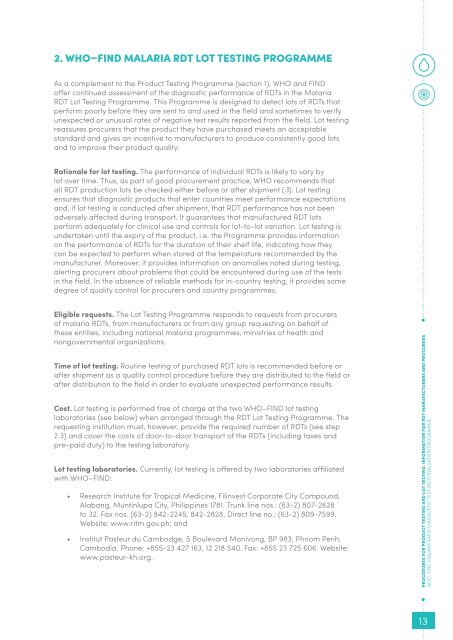WHO-2015_Procedures-malaria-RDT-productlot-testing
WHO-2015_Procedures-malaria-RDT-productlot-testing
WHO-2015_Procedures-malaria-RDT-productlot-testing
You also want an ePaper? Increase the reach of your titles
YUMPU automatically turns print PDFs into web optimized ePapers that Google loves.
2. <strong>WHO</strong>–FIND Malaria <strong>RDT</strong> Lot Testing Programme<br />
As a complement to the Product Testing Programme (section 1), <strong>WHO</strong> and FIND<br />
offer continued assessment of the diagnostic performance of <strong>RDT</strong>s in the Malaria<br />
<strong>RDT</strong> Lot Testing Programme. This Programme is designed to detect lots of <strong>RDT</strong>s that<br />
perform poorly before they are sent to and used in the field and sometimes to verify<br />
unexpected or unusual rates of negative test results reported from the field. Lot <strong>testing</strong><br />
reassures procurers that the product they have purchased meets an acceptable<br />
standard and gives an incentive to manufacturers to produce consistently good lots<br />
and to improve their product quality.<br />
Rationale for lot <strong>testing</strong>. The performance of individual <strong>RDT</strong>s is likely to vary by<br />
lot over time. Thus, as part of good procurement practice, <strong>WHO</strong> recommends that<br />
all <strong>RDT</strong> production lots be checked either before or after shipment (3). Lot <strong>testing</strong><br />
ensures that diagnostic products that enter countries meet performance expectations<br />
and, if lot <strong>testing</strong> is conducted after shipment, that <strong>RDT</strong> performance has not been<br />
adversely affected during transport. It guarantees that manufactured <strong>RDT</strong> lots<br />
perform adequately for clinical use and controls for lot-to-lot variation. Lot <strong>testing</strong> is<br />
undertaken until the expiry of the product, i.e. the Programme provides information<br />
on the performance of <strong>RDT</strong>s for the duration of their shelf life, indicating how they<br />
can be expected to perform when stored at the temperature recommended by the<br />
manufacturer. Moreover, it provides information on anomalies noted during <strong>testing</strong>,<br />
alerting procurers about problems that could be encountered during use of the tests<br />
in the field. In the absence of reliable methods for in-country <strong>testing</strong>, it provides some<br />
degree of quality control for procurers and country programmes.<br />
Eligible requests. The Lot Testing Programme responds to requests from procurers<br />
of <strong>malaria</strong> <strong>RDT</strong>s, from manufacturers or from any group requesting on behalf of<br />
these entities, including national <strong>malaria</strong> programmes, ministries of health and<br />
nongovernmental organizations.<br />
Time of lot <strong>testing</strong>. Routine <strong>testing</strong> of purchased <strong>RDT</strong> lots is recommended before or<br />
after shipment as a quality control procedure before they are distributed to the field or<br />
after distribution to the field in order to evaluate unexpected performance results.<br />
Cost. Lot <strong>testing</strong> is performed free of charge at the two <strong>WHO</strong>–FIND lot <strong>testing</strong><br />
laboratories (see below) when arranged through the <strong>RDT</strong> Lot Testing Programme. The<br />
requesting institution must, however, provide the required number of <strong>RDT</strong>s (see step<br />
2.3) and cover the costs of door-to-door transport of the <strong>RDT</strong>s (including taxes and<br />
pre-paid duty) to the <strong>testing</strong> laboratory.<br />
Lot <strong>testing</strong> laboratories. Currently, lot <strong>testing</strong> is offered by two laboratories affiliated<br />
with <strong>WHO</strong>–FIND:<br />
• Research Institute for Tropical Medicine, Filinvest Corporate City Compound,<br />
Alabang, Muntinlupa City, Philippines 1781. Trunk line nos.: (63-2) 807-2628<br />
to 32. Fax nos. (63-2) 842-2245, 842-2828. Direct line no.: (63-2) 809-7599.<br />
Website: www.ritm.gov.ph; and<br />
• Institut Pasteur du Cambodge, 5 Boulevard Monivong, BP 983, Phnom Penh,<br />
Cambodia. Phone: +855-23 427 163, 12 218 540. Fax: +855 23 725 606. Website:<br />
www.pasteur-kh.org.<br />
<strong>Procedures</strong> for product <strong>testing</strong> and lot <strong>testing</strong>. Information for <strong>RDT</strong> manufacturers and procurers<br />
<strong>WHO</strong>–FIND Malaria Rapid Diagnostic Test (<strong>RDT</strong>) Evaluation Programme<br />
13


